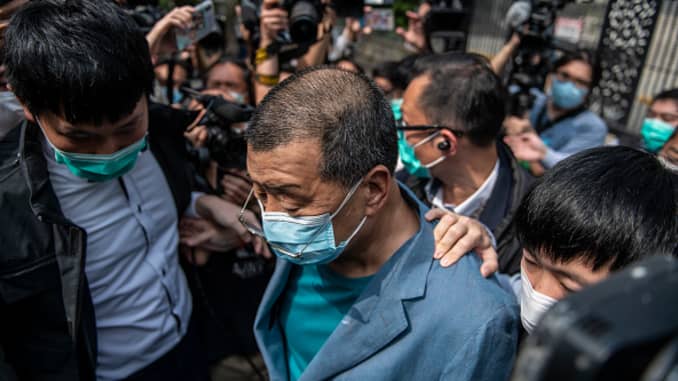US and other foreign governments condemn Hong Kong arrests of democracy activists
KEY POINTS
- The arrests on Saturday were the biggest crackdown on the city’s pro-democracy movement since the outbreak of mass protests last year.
- The Trump administration on Saturday condemned Hong Kong’s arrests of 15 activists, including veteran politicians, a publishing tycoon and senior barristers, describing them as “inconsistent” with China’s international commitments.
- The Hong Kong government defended the arrests, which the city’s Security Bureau said were carried out in line with the law.

Police Officers escort Jimmy Lai out of his House on April 18, 2020 in Hong Kong, China. The Hong Kong police have arrested 14 people involved in last years anti-government protest including pan-democrat lawmakers.
Vernon Yuen | NurPhoto | Getty Images
Foreign governments criticized the arrest of 15 Hong Kong democracy activists in a police sweep on charges of organizing and participating in anti-government protests last year.
The arrests on Saturday were the biggest crackdown on the city’s pro-democracy movement since the outbreak of mass protests last year.
The International Bar Association said the authorities should not encroach on human rights and the legal system must guard against any abuses of power when the world was preoccupied with the coronavirus pandemic.
“The United States condemns the arrest of pro-democracy advocates in Hong Kong,” U.S Secretary of State Mike Pompeo said.
“Beijing and its representatives in Hong Kong continue to take actions inconsistent with commitments made under the Sino-British Joint Declaration that include transparency, the rule of law, and guarantees that Hong Kong will continue to ‘enjoy a high degree of autonomy,’” he said.
The arrested supporters of the pro-democracy movement included Democratic Party founder and barrister Martin Lee, 81, millionaire publishing tycoon Jimmy Lai, 71, and former lawmaker and barrister Margaret Ng, 72.
Police said those arrested were aged between 24 and 81, and they were detained on charges of organizing and participating in “unlawful assemblies” on Aug. 18 and Oct. 1 and 20 last year.
Major and often violent demonstrations broke out across the former British colony on those days.
They were all due to appear in court on May 18. Police said more arrests were possible.
Some of those arrested were released on bail late on Saturday.
In Britain, a Foreign Office representative said the government expected any arrests and court procedures to be “conducted in a fair and transparent manner.”
Trust and dialogue
The Foreign Office also said the right to peaceful protest was “fundamental to Hong Kong’s way of life” and authorities should avoid “actions that inflame tensions.”
“The authorities should focus on rebuilding trust through a process of meaningful political dialogue,” the Foreign Office said.
The Hong Kong government defended the arrests, which the city’s Security Bureau said were carried out in line with the law.
“In Hong Kong, everyone is equal before the law ... No one has any special privileges,” said a bureau spokesman.
The International Bar Association condemned the arrests of Lee and Ng, who have been active human rights and rule of law campaigners during their careers.
It was vital that justice was applied transparently in Hong Kong, especially while the world is gripped by the coronavirus pandemic, it said.
“It is critical that authorities do not use their powers to encroach on fundamental human rights, and it is vital that legal systems continue to protect citizens from any abuse of power which may otherwise be unseen during the COVID-19 crisis in which the international community is submerged,” it said in a statement emailed to Reuters.
In a special report published on Tuesday, three of Hong Kong’s top judges told Reuters that the independence of the city’s judicial system is under assault from the Communist Party leadership in Beijing. The judiciary, they said, is in a fight for its survival.
Hong Kong returned to Beijing in 1997 under a “one country, two systems” formula that guarantees it broad freedoms not seen in mainland China, and a high degree of autonomy.

No comments:
Post a Comment